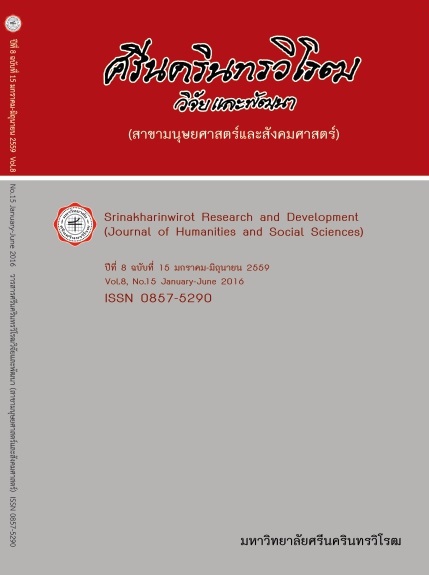การนำนโยบายก๊าซ NGV ไปสู่การปฏิบัติ NGV POLICY IMPLEMENTATION
Keywords:
ก๊าซ NGV นโยบายก๊าซ NGV การนำนโยบายก๊าซ NGV ไปสู่การปฏิบัติAbstract
บทคัดย่อ
การวิจัยครั้งนี้มีวัตถุประสงค์ดังนี้ 1) เพื่อศึกษาปัญหาที่เกิดขึ้นจากการนำนโยบายก๊าซ NGV ไปสู่การปฏิบัติ 2) เพื่อศึกษาสาเหตุของปัญหาที่เกิดขึ้นจากการนำนโยบายก๊าซ NGV ไปสู่การปฏิบัติ 3) เพื่อศึกษาวิธีการแก้ไขปัญหาที่เกิดขึ้นจากการนำนโยบายก๊าซ NGV ไปสู่การปฏิบัติ การวิจัยนี้เป็นการวิจัยเชิงคุณภาพโดยใช้การสัมภาษณ์เชิงลึกในการรวบรวมข้อมูลซึ่งคำถามแบบกึ่งโครงสร้าง กลุ่มตัวอย่างเป็นแบบเจาะจง 5 กลุ่มๆ ละ6 คน รวมเป็น 30 คน ได้แก่ กลุ่มนักวิชาการด้านก๊าซ NGV กลุ่มข้าราชการกระทรวงพลังงาน กลุ่มผู้บริหารของผู้ประกอบการด้านพลังงาน กลุ่มผู้บริโภคที่ใช้ก๊าซ NGV และกลุ่มผู้ประกอบการสถานีบริการก๊าซ NGV
การวิเคราะห์ข้อมูลใช้การวิเคราะห์เชิงพรรณนาและเชิงอธิบาย ผลการวิจัยปัญหาที่เกิดขึ้นจากการนำนโยบายก๊าซ NGV ไปสู่การปฏิบัติ ได้แก่ 1) ปริมาณก๊าซ NGV ที่ให้บริการไม่ทั่วถึง 2) ปัญหาเรื่องราคาขายปลีกที่ไม่เป็นธรรม 3) การแต่งตั้งข้าราชการระดับสูงไปเป็นกรรมการ 4) การเติมก๊าซ CO2 เพิ่มในก๊าซ NGV อีก 18% ทำให้คุณภาพลดลง
ข้อเสนอแนะจากการวิจัย มีดังนี้ 1) ปัญหาปริมาณก๊าซ NGV ขาดแคลน ควรเร่งดำเนินการขยายแนวท่อส่งก๊าซธรรมชาติให้ครอบคลุมเพื่อก่อสร้างสถานีบริการก๊าซ NGV โดยเร็ว 2) ควรมีการตรวจสอบการคิดต้นทุนในเรื่องต่างๆ ไม่ให้ซ้ำซ้อนเพื่อปล่อยให้ราคาลอยตัวโดยเสรี ที่สำคัญในส่วนของข้อมูลโครงสร้างสัญญาราคาเนื้อก๊าซควรมีการเปิดเผยต่อสาธารณะอย่างชัดเจนและต่อเนื่องเพื่อความโปร่งใสและสามารถตรวจสอบได้รวมถึงการคำนวณต้นทุนการแยกก๊าซเพื่อใช้เป็นข้อมูลในการกำหนดโครงสร้างราคาในอนาคตให้เป็นธรรม
3) ควรพิจารณาถึงความเป็นไปได้ในยกเลิกการเติมก๊าซ CO2 เพิ่มในก๊าซ NGV ภายในระยะเวลาที่กำหนดโดยเร็ว และ 4) การคัดเลือกกรรมการควรมีการคัดเลือกผู้ที่เหมาะสมมีความรู้ ความสามารถ เพื่อเป็นตัวแทนในการเข้ามาช่วยรักษาผลประโยชน์ด้วยความโปร่งใส ควรตรวจสอบทรัพย์สินและที่มาของทรัพย์สินของผู้ที่จะเข้ามาเป็นกรรมการต้องทำทั้งก่อนและหลังรับตำแหน่งด้วย เพื่อความมั่นคงทางด้านพลังงานของประเทศต่อไป
Abstract
The objective of this dissertation aims to study as the following. 1) to study the barriers from NGV policy implementation. 2) to study the cause from NGV policy implementation. 3) to identifies the resolutions that arise from NGV policy implementation. The research instruments for qualitative data collection were in-depth interview questions as primary information. The qualitative data were gathered from all information concerning natural gas for vehicles was searched from well written documents, literature reviews, theories, articles, related research papers and related NGV policy reports and gathered for the data analysis. A semi-structured interview was used in the study to gain more in-depth information comprising 30 respondents in six members of each of the five separate groups. An analysis of Qualitative Study was interpreted in terms of descriptive and intelligible study to reveal the main reasons and comprehensive useful relationship of NGV policy among the NGV consumers.
Its problem was found that 1) The NGV services are not sufficiently. 2) The retail price is not fair. 3) To assign the government officer to be a PTT’s broad committee 4) The CO2 added 18% in NGV.
The suggestion of the study were as follows: 1) To be increase the natural gas pipelines in some publicly serviced areas 2) Examining the duplicated cost for leave the retail price float and the interactive communication should collaboratively clear 3) Consider to eliminate the CO2 add in NGV.
4) Consider the thoroughly function person for clearly representative in PTT broad committee.
Downloads
Downloads
Published
How to Cite
Issue
Section
License
Srinakharinwirot Research and Development Journal of Humanities and Social Sciences is licensed Under a Creative Commons Attribution-NonCommercial-NoDerivs 4.0 International (CC-BY-NC-ND 4.0) License, Unless Otherwise Stated. Please Read Journal Policies Page for More Information on Open Access, Copyright and Permissions.



